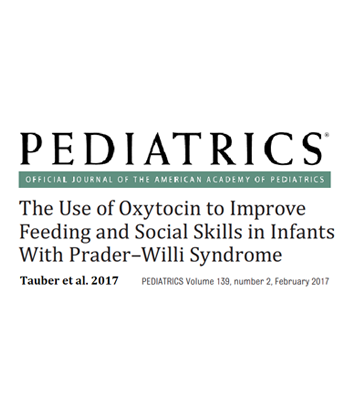Clinical trials
Phase I clinical study – OTBB1
Single intranasal administration of oxytocin in neonates with Prader-Willi syndrome
A phase I study in patients aged 1 to 5 months showed good tolerance for biological and vital parameters in the treated children and good safety of the treatment.
Phase II clinical study – OTBB2 (Tauber, 2017)
Repeated intranasal administration of oxytocin in neonates with Prader-Willi syndrome (link to publication)
The team at the Rare Diseases Reference Centre for Prader-Willi Syndrome and other rare forms of obesity with eating disorders, led by Professor Maithé Tauber at Toulouse University Hospital, conducted a phase II study on 18 newborns under six months old.
This study shows that daily intranasal administration of oxytocin for seven days normalises sucking in 88% of treated children and significantly improves feeding problems, social behaviour and mother-child interactions. The treatment was well tolerated.

Follow-up study of children treated in OTBB2 – OT2suite
OT2suite is a follow-up study of children treated in the OTBB2 clinical trial, up to the age of four, compared to a cohort of untreated children. This study confirmed the very good long-term tolerance of the treatment (link to publication).
Phase III clinical trial – OTBB3
Oxytocin treatment in neonates and infants aged from 0 to 3 months with Prader-Willi syndrome: a study of safety and efficacy on oral and social skills and feeding behaviour
The European phase III study OTBB3 aims to confirm the beneficial effects of oxytocin on sucking and swallowing deficencies as well as on behavioural and social interaction disorders in newborns and infants with Prader-Willi syndrome.

Follow-up study of children treated in OTBB3 – OTBB3 Follow-up
The follow-up and comparison of the oxytocin treated children with a cohort of untreated children in the OTBB3 Follow-up study will make it possible to confirm the long-term safety of the drug and to demonstrate whether early treatment has a positive long-term impact on their developmental trajectory, by acting on the course of the disease.
